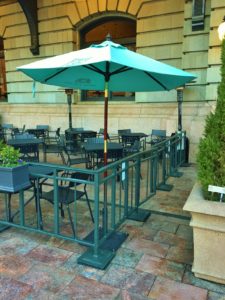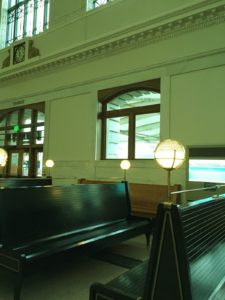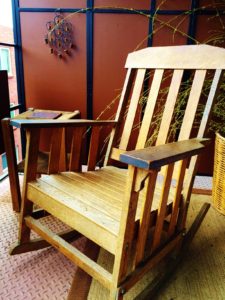waiting
Patience is not passive; … it is active; it is concentrated strength.
Every day, I would read those words on a poster in the coat room, as I walked through the United Way daycare to pick up my children. The poster’s image was nothing, meaningless, now forgotten – the words, arresting. Every single day.
I had minimal patience in those days. In my mid-20’s with a failed marriage, no education, and three preschoolers to shepherd out to the bus stop and home, my days consisted of proving my worth at work, my nights of making supper, giving baths, reading stories, and singing lullabies until I myself fell asleep, my arms outstretched to hold tiny hands reaching out from a baby crib on one side, bunk bed on the other side, holding our world together by sheer will within that apartment bedroom.
But each day, Monday through Friday, that poster at the daycare caused me to physically hesitate, my thinking skip a beat, the quick in-breath, mental note. Patience. Strength. It took me 25 years to look up the author: Edward G. Bulwer-Lytton, a British poet, novelist, and politician who lived in the 1800’s. He is the author of that classic, ridiculously dramatic opening line: “It was a dark and stormy night….”
That was the essence of my 20’s, maybe everyone’s 20’s. I had certainly created a dark and stormy night for myself, a time of intensity and difficulty and fearful mess. Yet I was drawn to this hope that patience could be a practice of actively collecting strength for a time when it is needed most. That I could learn to stay calm, wait out the storm. That I could gain certainty the storm would indeed pass.
Samuel Beckett’s Waiting for Godot has been acclaimed by some as the most influential literary work of the 20th century. It has also been famously described as a play in which nothing happens – twice. Beckett had a thing for bicycles, inserting bicycles into most of his works, even going so far as to create a piece in which Act 1 is entitled “8,” the two wheels vertical, and Act 2 is the figure 8 horizontal, the symbol for infinity. But in Waiting for Godot, he did not; instead, the play itself is the bicycle: two acts, two main characters as a dysfunctional societal team talking about taking action who never do, interacting with two antagonist political characters representing power and worth, all things in tandem, in tension. But riderless, as they wait for the unseen, unknown Godot who never arrives, “but surely tomorrow.”
So often, we talk about the worth of our lives, but we fail to act. We wait. And wait longer. It feels like watching a play in which nothing ever happens. It is actually allowing fear to mean more than possibility. It is impatient with the discomfort of life, yet still passive. Riderless.
When we are young, we are shocked by the deceit and violence in the world. So much drama. Our attention is utterly captive to this “dark and stormy night.” We may fall into despair, that occupational hazard of being human, of existing in a corrupt society and cruel world. We can fear for our very lives, our future. We fear for the lives entrusted to us, as well, the ones who cry with small voices when they get tired, complain endlessly over their temporary hardships, expect nurturing and comfort, and demand both meaning and entertainment in their interactions.
Or is that the characters waiting for Godot.
Or is that me. Still. All these years later.
If I staged Waiting For Godot, I would make the first act Youth – so many ideas, possibilities discussed, dreams awaiting. For the second act, I would costume the characters as Adulthood – business people in dull suits, still sitting in the same place, same ideas, same possibilities discussed, dreams still waiting.
On some level, we know. We know that to avoid failing at something meaningful, we stall with endless, meaningless postponement. Mundane drama. Where nothing continues to happen.
Beckett has said that this play was not about waiting for God, for a God Moment. He told one interviewer that, in fact, he had spent just such a day waiting to catch a glimpse of a well-known bicyclist in a road race, a man named Godeau, who never came by where Beckett waited. So he wrote about what he experienced. Does that make his play less meaningful, less symbolic of the way we live our lives? Beckett had a realization of the futility of waiting passively for something wonderful to show up in his life.
May we all have such a moment.
“Books are but waste paper unless we spend in action the wisdom we get from thought.” – Edward G. Bulwer-Lytton
 I am waiting, here with Edward G. Bulwer-Lytton. I am concentrating my strength as I save and plan, getting ready to go out into the world and “spend in action the wisdom” I am gaining. Maybe Ed started out in that dark and stormy night, young and dramatic, just like me, but he also later wrote The Last Days of Pompeii. And also this:
I am waiting, here with Edward G. Bulwer-Lytton. I am concentrating my strength as I save and plan, getting ready to go out into the world and “spend in action the wisdom” I am gaining. Maybe Ed started out in that dark and stormy night, young and dramatic, just like me, but he also later wrote The Last Days of Pompeii. And also this:
“Patience is the courage of the conqueror, the strength of man against destiny.”
Feel like those words could take me somewhere.



